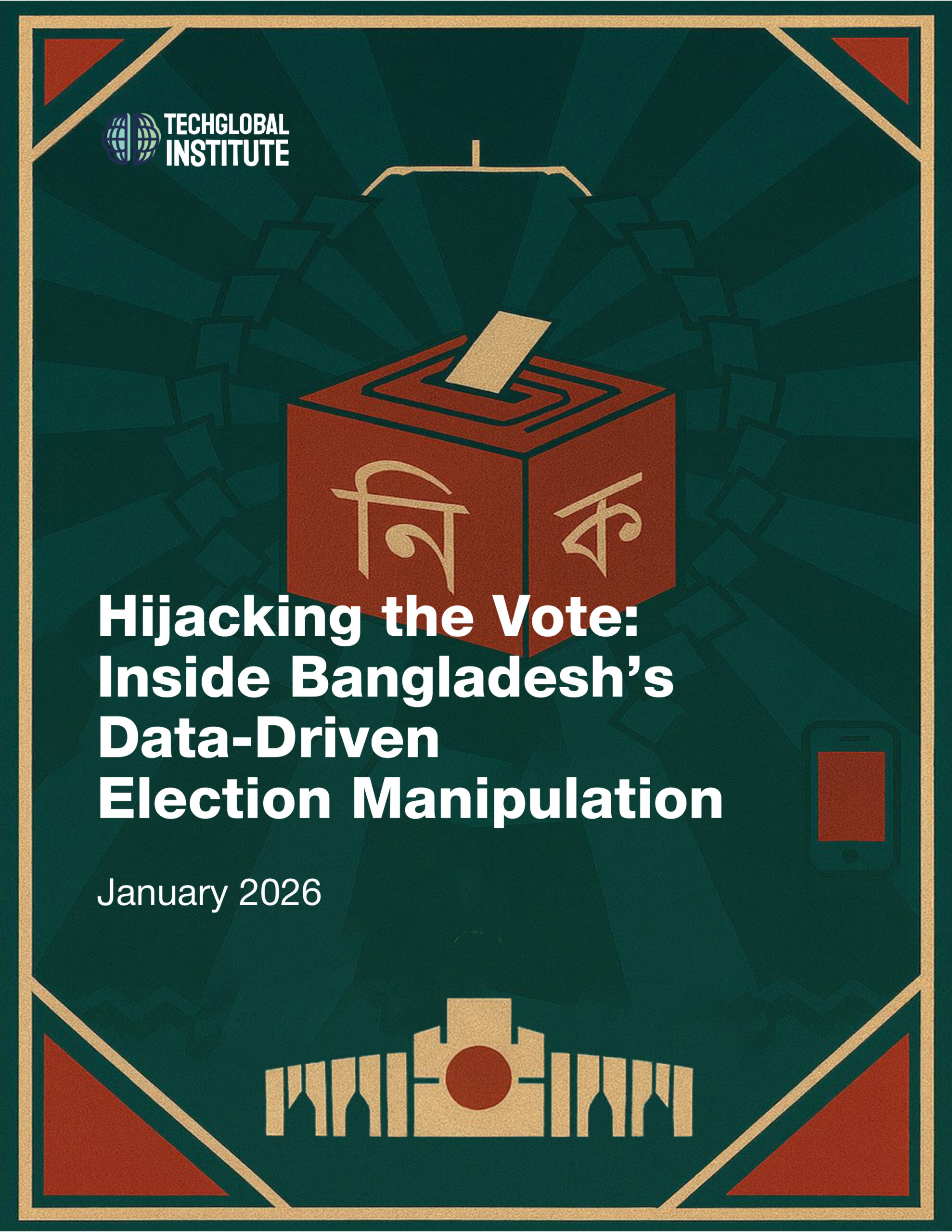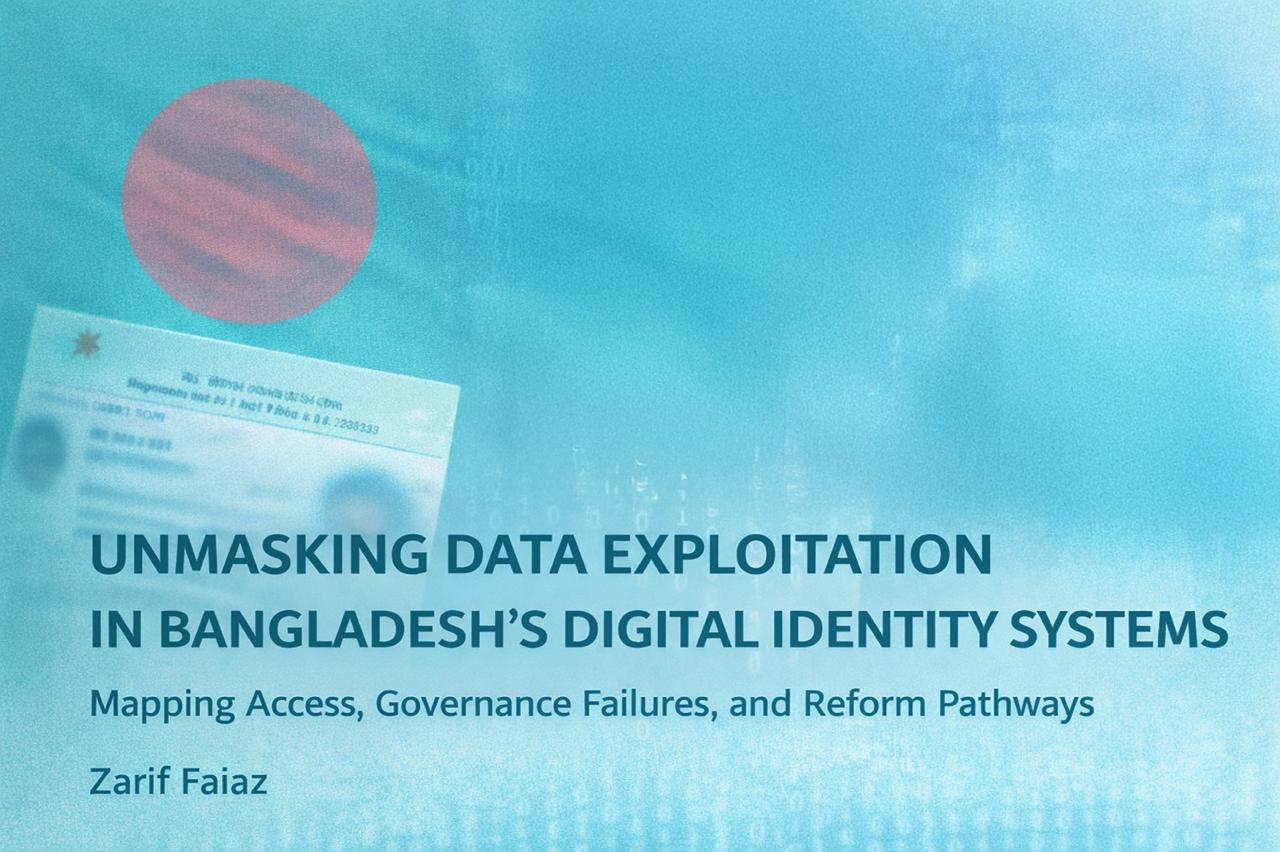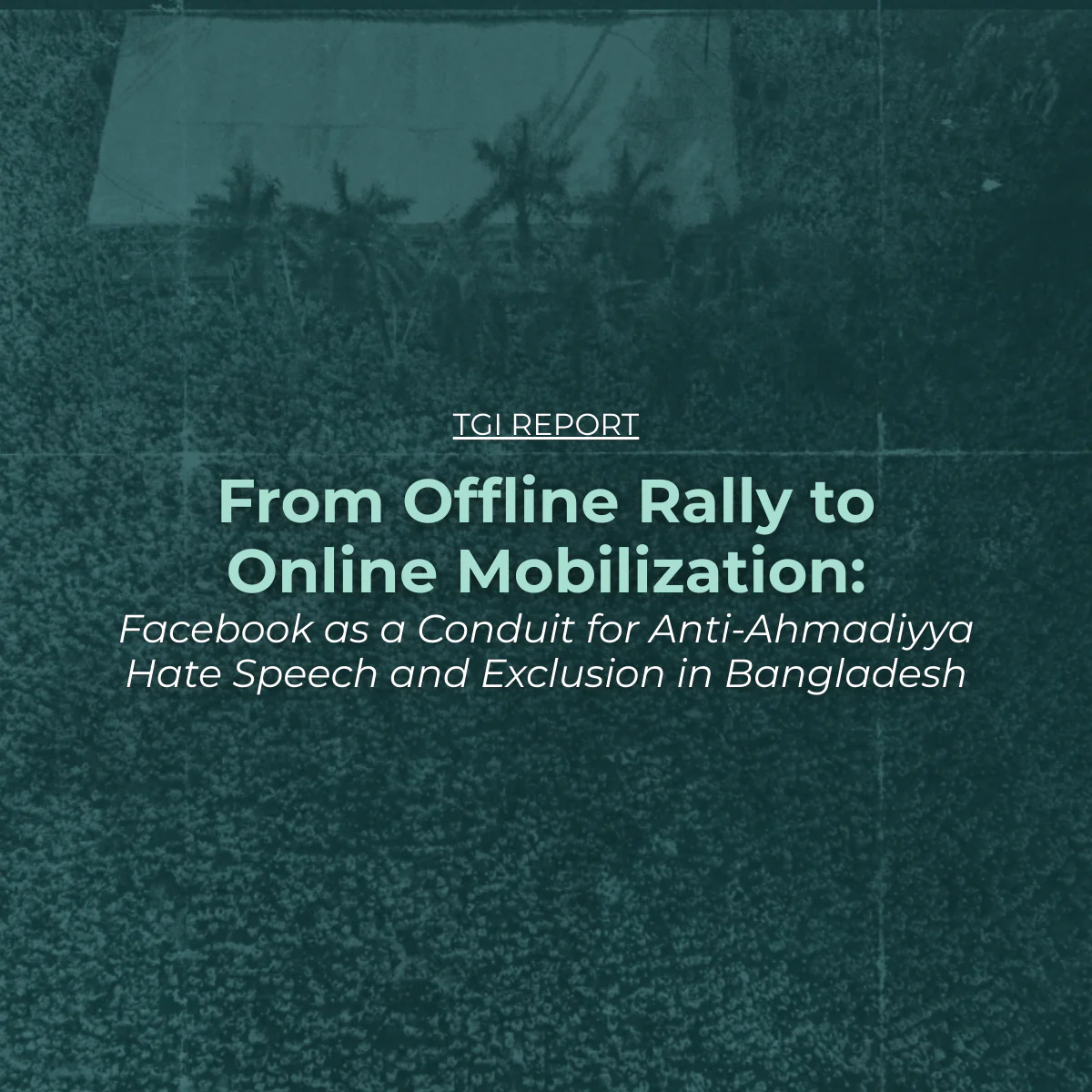Our analysis finds that Google Search ranks ultranationalist outlets more prominently, thereby fueling a global disinformation campaign amid heightened diplomatic tensions
On November 25, 2024, Bangladeshi authorities arrested Chinmoy Krishna Das, a Hindu monk and community leader, on sedition charges—a move that sparked violent clashes between his supporters and the police, and escalated tensions between Bangladesh and India. The incident drew considerable media attention across South Asia and beyond, particularly after a lawyer was killed in Chattogram, thousands of Hindu monks in West Bengal attempted a march to the Bangladesh border, and activists in India attacked a Bangladeshi diplomatic outpost in retaliation.
This event unfolded amid heightened diplomatic tensions between India and Bangladesh—a historically close ally and strategic partner critical to India’s border security—following the ouster of former Prime Minister Sheikh Hasina. Ultranationalist Indian voices intensified the rhetoric by accusing Bangladesh’s interim government of enabling a “Hindu genocide” despite local and Western media reporting otherwise, including a report from Tech Global Institute that found evidence of coordinated disinformation exploiting existing inter-religious tensions.
Google Search results for this incident and the broader narrative regarding the treatment of Hindu minorities in Bangladesh failed to highlight original, on-the-ground reporting from Bangladeshi sources. Instead, the search landscape was overwhelmingly dominated by Indian media outlets, including those known for heavily opinionated and subjective coverage, amplifying mis- and disinformation about the situation in Bangladesh among international quarters. This imbalanced prioritization by such a critical information gatekeeper, neglecting to account for the ground realities, accurate representation, and objective, verifiable facts, ultimately distorted the narrative surrounding this sensitive and high-stakes situation, and led to disproportionate diplomatic outrage and international responses regarding inter-religious tensions in Bangladesh and the country’s stability following the fall of the prior regime.
An insular, one-dimensional portrayal of Bangladesh, filtered through India’s politicized and nationalist-driven media and information ecosystem not only reinforces harmful stereotypes but also risks undermining Bangladesh’s diplomatic autonomy, distorting foreign policy, deterring foreign investment, and threatening its democratic transition. Yet, while widespread social media misinformation about the lead-up to and aftermath of the arrest received some scrutiny, Google Search’s performance went largely unchecked.
This report examines the platform’s search bias, the lack of algorithmic accountability, and the broader implications of these issues, particularly in the context of minority rights, disinformation, and regional and geopolitical relations.
ANALYSIS
We implemented a structured approach to analyze the purported bias in Google’s search ranking, examining geographic variations, linguistic and keyword differences, and a comparison between incognito and standard browser search results. Chrome, which defaults to Google Search, and Microsoft Bing, was used to conduct this assessment. We focused on organic search results, and produced a dataset consisting of search results based on aforementioned variables for approximately 4 weeks (November 25 and December 20). A detailed methodology can be found in the appendix section.
Collected data reveals a consistent pattern of bias in search results across multiple geographic locations, with Indian news outlets—some of which presented one-sided, subjective, and often right-wing ideology driven reporting—disproportionately dominating the results for queries related to the Chinmoy Krishna Das case. This trend was observed despite available and pertinent coverage from reputable Bangladeshi, non-Indian and Western news sources.
On December 6, 2024, searches of terms “Chinmoy Krishna Das” and its Bangla equivalent “চিন্ময় কৃষ্ণ দাস” were conducted from Bangladesh. When the search term was entered in English, results demonstrated a clear bias, with Indian news outlets such as Times of India, The Hindu, Hindustan Times, and The Indian Express dominating both the top story carousel and the first page of search results—overshadowing factual reporting from credible Bangladeshi media outlets like The Daily Star, The Business Standard, and Prothom Alo, despite the search originating from within Bangladesh, the country where the incident originally occurred.
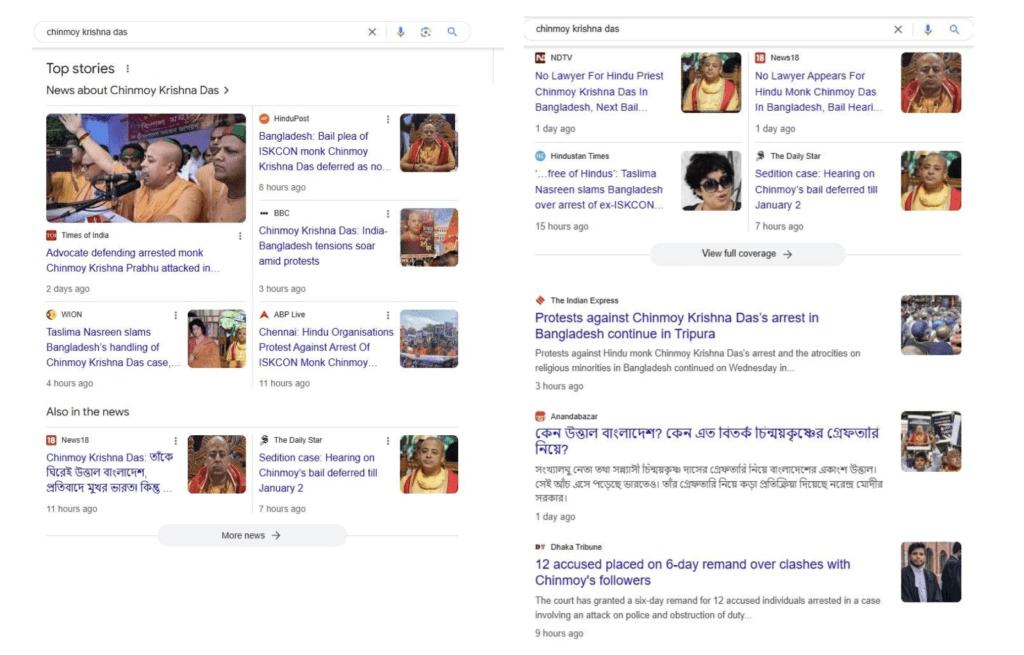
Searching the name in Bangla from Bangladesh yielded slightly more balanced results, with near-equal representation of news outlets from Bangladesh and India.
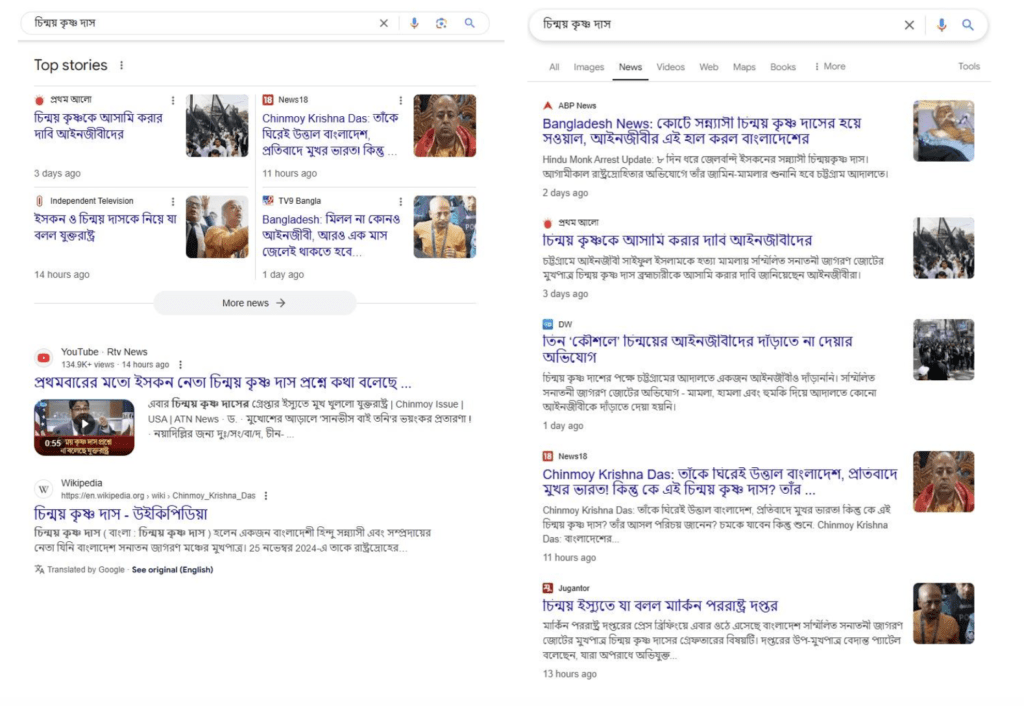
Our search for the term “Chinmoy Krishna Das” was replicated between December 1 and December 14 in both English and Bangla from locations in Australia, the European Union (Austria and France), the United Kingdom, and the United States. The observed bias in favor of Indian-origin news outlets persisted in these searches.
Approximately 90% of the content in the top stories carousel, video carousel, and the first page of search results originated from Indian outlets when searched from Australia and the United States in both languages. Moreover, the news search tab for these locations showed a similar trend, with the first twelve pages containing no coverage by Bangladeshi outlets when searched from Australia. Coverage from reputed Bangladeshi media sources like The Daily Star, The Business Standard, and Dhaka Tribune only appeared on the thirteenth and fourteenth pages, while less prominent, hyper regional or ultranationalist Indian sources like PGurus, DD News, and Lokmat Times ranked higher. Some of this may be attributed to publisher agreements Google has with news publishers and aggregators, however this data is not publicly available and we cannot ascertain correlation between search ranking and publisher agreements with certainty.
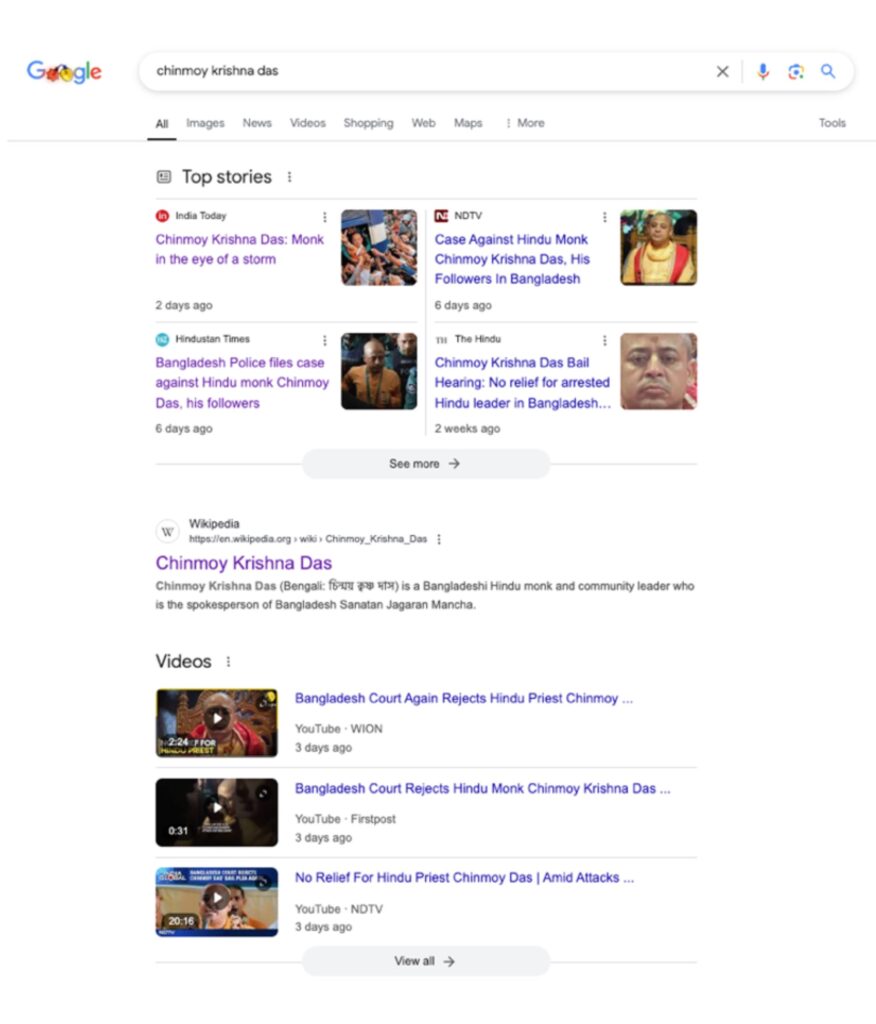
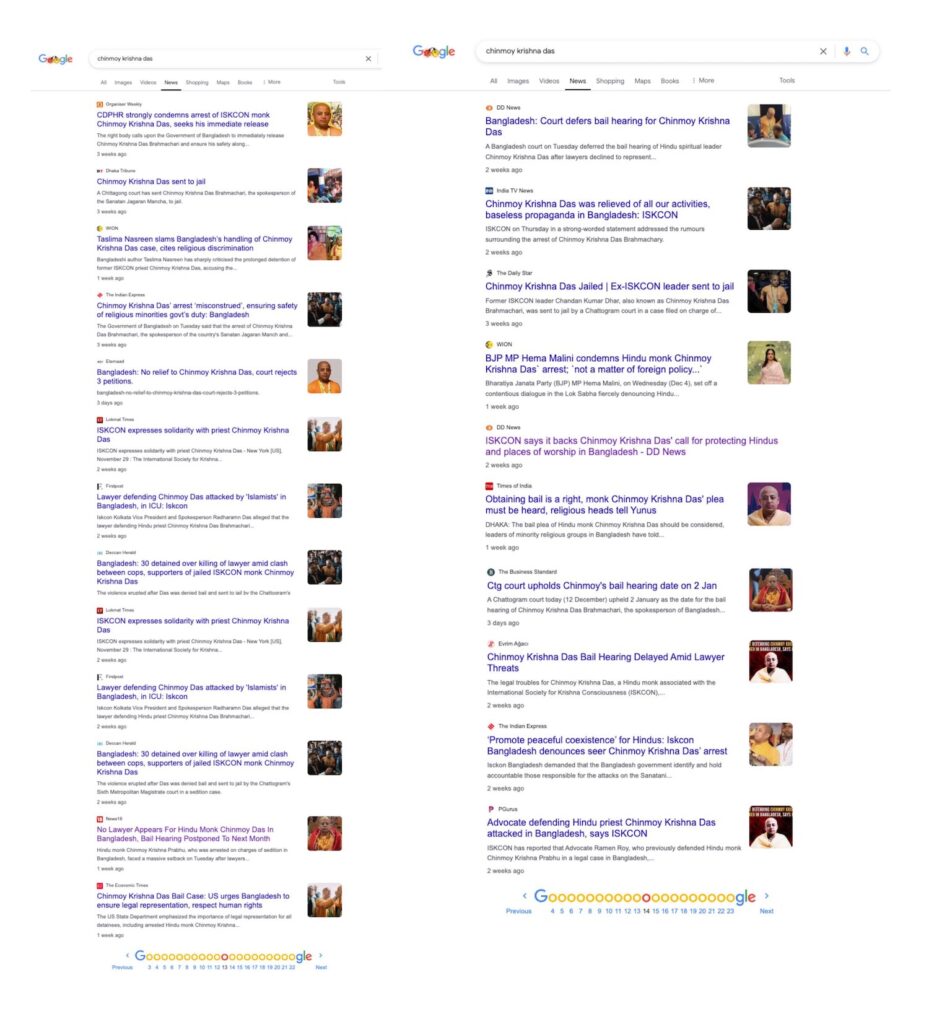
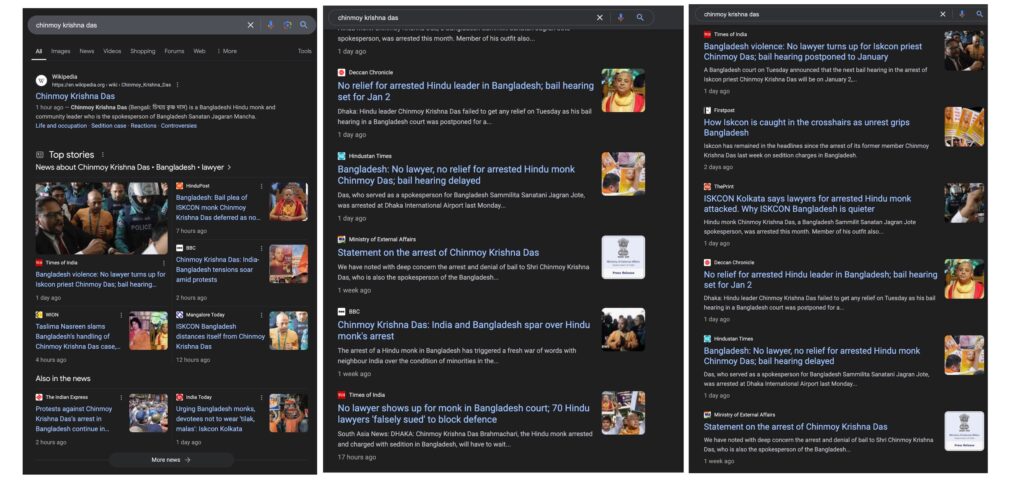
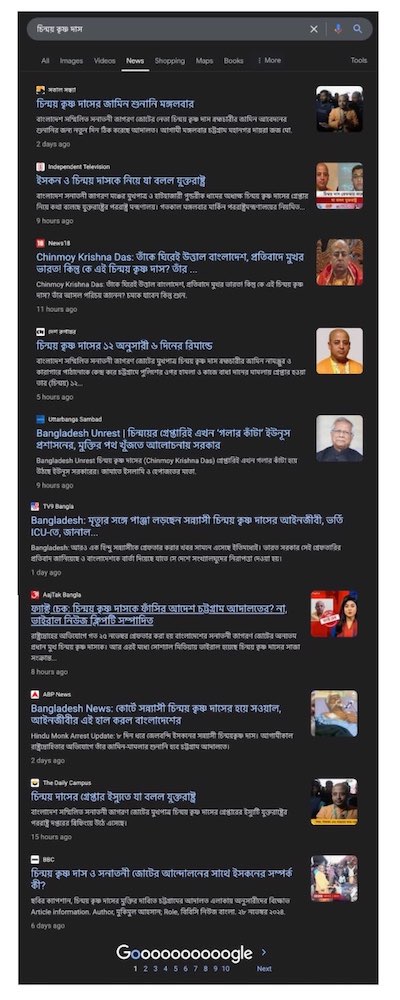
Both in the United Kingdom and Austria, search results revealed similar patterns, with over 90% of the news content originating from Indian outlets, such as The Indian Express, The Hindu, Hindustan Times, and Firstpost.
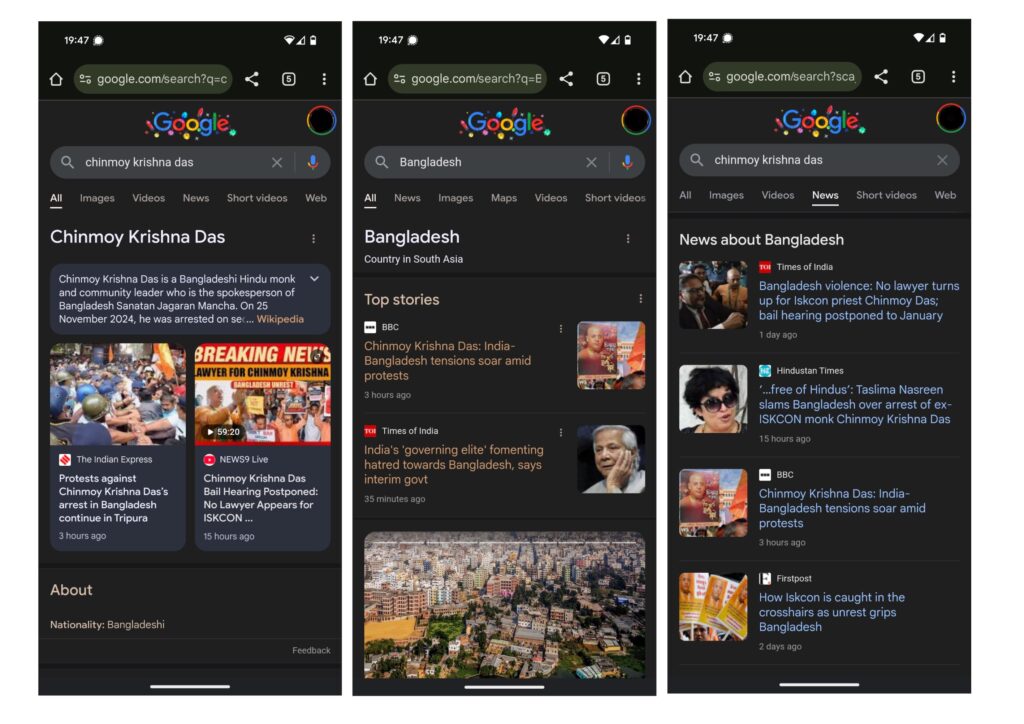
Queries for the term “Bangladesh” conducted within the European Union and the United States highlighted the ongoing tensions between Bangladesh and India in Google’s knowledge panel, while the top stories carousel and news tab displayed a more diverse set of sources compared to other regions, including coverage on domestic economic concerns, such as the impact of money laundering. However, a significant focus—approximately 80%—remained on Bangladesh-India tensions related to the arrest and the alleged increase in the persecution of Hindu minorities in Bangladesh after the interim government took over.
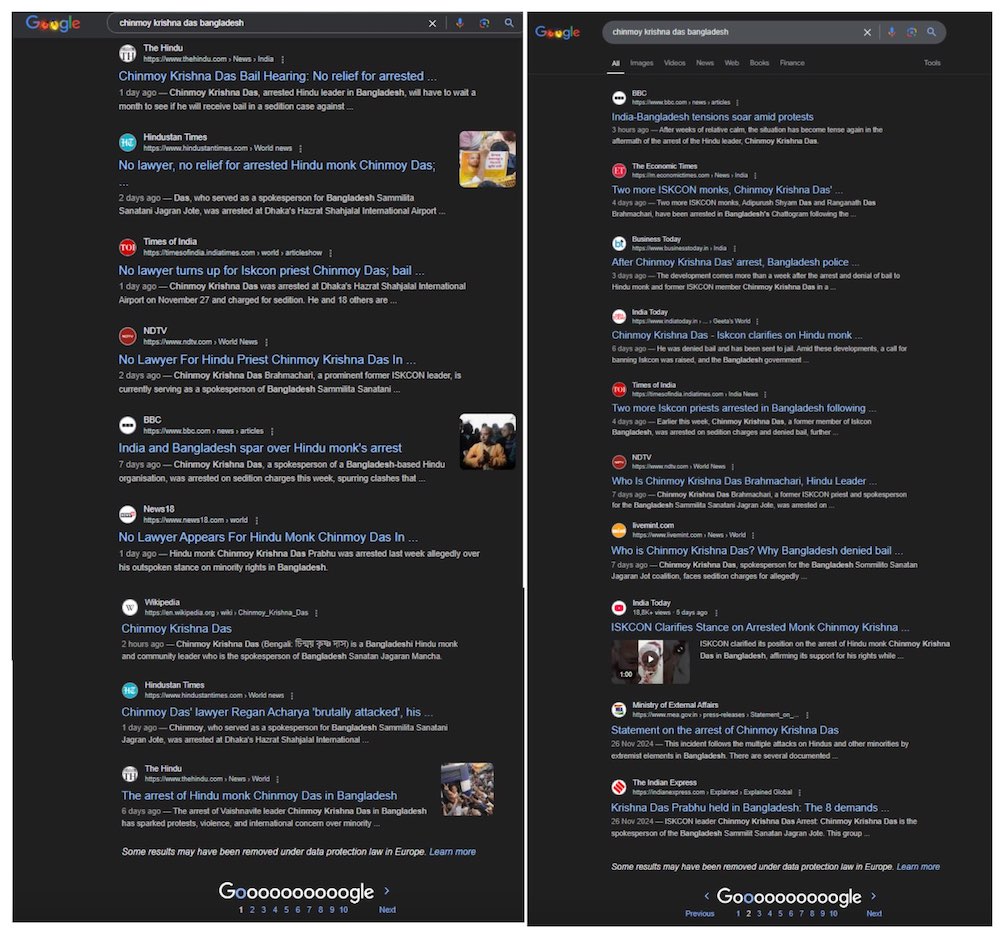
We replicated the aforementioned searches on Microsoft Bing, and found a slightly more balanced distribution across media outlets with approximately 65% of results tied to Indian media sources, and 35% results linked to Bangladeshi and Western media outlets.
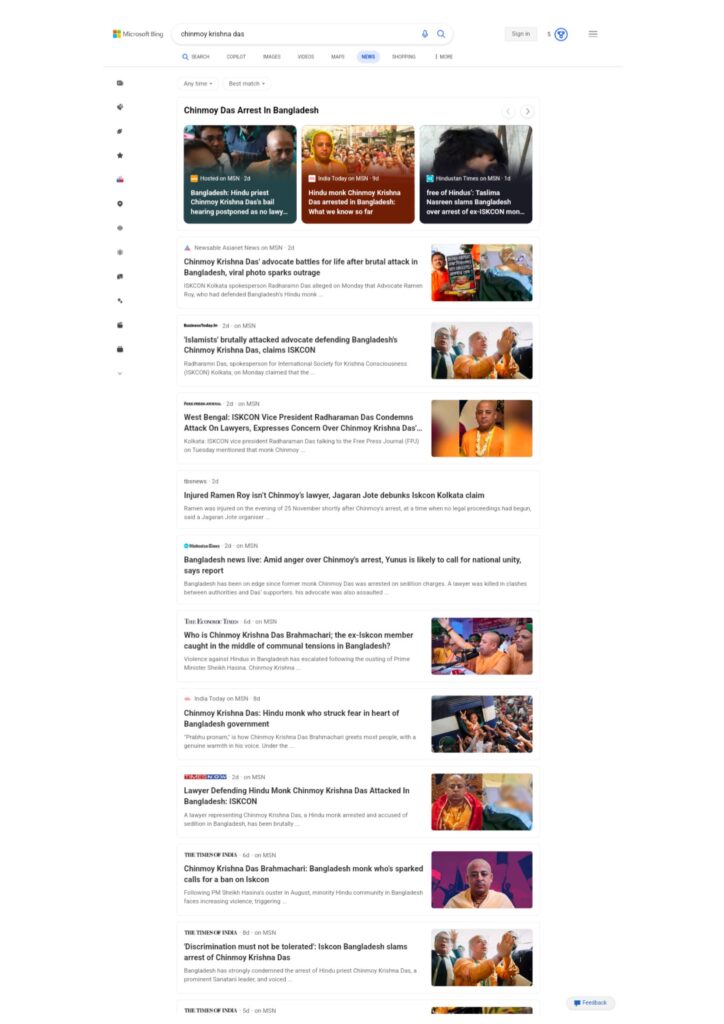
These Google search results reveal a consistent pattern of heavily prioritizing Indian media sources, particularly those known for their ultranationalist leanings, over credible, national media sources from Bangladesh and elsewhere. This resulted in factually inaccurate and sensationalized information dominating the international discourse surrounding the political and communal situation in Bangladesh, and contributed to a growing disinformation campaign.
Notably, this is not an isolated case of coordinated disinformation and influence operation that experts and researchers have attributed to Indian sources. A weekend before the Queen’s funeral in September 2022, violence erupted between Muslims and Hindus across England’s East Midlands region, particularly in Leicester, fueled by religiously inflammatory videos circulating on social media. A review of 200,000 tweets by BBC Monitoring revealed that more than half of the mentions originated from accounts geo-tagged to India, with hashtags like #Leicester, #HindusUnderAttack, and #HindusUnderattackinUK. Commentators observed that India’s ruling party, the Bharatiya Janata Party (BJP), was involved in the social media campaign, with government-affiliated cyber volunteers and the party’s technology cell spreading disinformation and targeting religious minorities online. Similarly, in 2020, EU DisinfoLab uncovered a 15-year-long influence operation orchestrated through a sophisticated network of fake media outlets managed by a Delhi-based company, designed to discredit Pakistan internationally and influencing the UN Human Rights Council and the European Parliament.
REGIONAL DISCREPANCIES IN GOOGLE SEARCH
In stark contrast to how Bangladesh-based sources were overshadowed by Indian ones in coverage related to Bangladesh, Google Search demonstrates its ability to handle regional source prioritization at a far more granular level within the United States.
For instance, Google Search included in its top results coverage by local news outlets of the recent shooting incident in Madison, a city in Wisconsin, despite the wide coverage by major U.S. news outlets with high domain authority. On December 16, 2024, queries for “madison school shooting” featured local sources—FOX6 News Milwaukee and WLUK FOX 11—in the news carousel, while the first page of the news search featured local outlets like WSIN and WSAW. Given Google’s capability to prioritize hyperlocal content within specific regional markets in the United States, one can reasonably question why the same approach is not applied to ensure that local news sources are equally prioritized for much larger, country-level contexts in other regions.
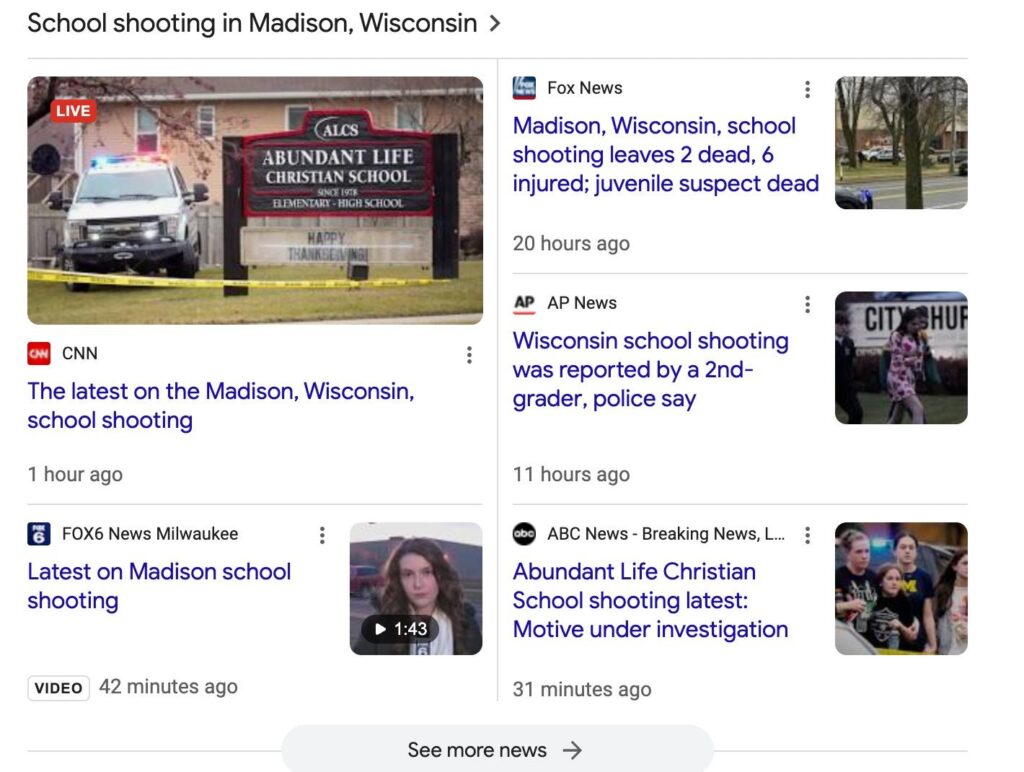
To further qualify our analyses, we queried events occurring in South Korea or the Philippines on both Google Search and Microsoft Bing, and found predominantly Western media sources such as CNN, the New York Times and Reuters occupying the top 20 search results.
HOW GOOGLE RANKS ITS SEARCH RESULTS
According to publicly available information, Google’s search ranking system sorts through ‘hundreds of billions of web pages and other content in [its] [s]earch index to present the most relevant, useful results’ by evaluating various factors and signals. As outlined in its search quality rating guidelines, overall ranking is determined by a myriad of factors and benchmarks, including the E-E-A-T framework— which assesses the experience, expertise, authoritativeness, and trustworthiness of websites, content, and creators—as well as factors like user location, query simplicity and clarity, spelling, alternative meanings, search history, and user settings. Algorithmic models, such as PageRank, aim to decipher users’ search intent based on the words used in the query as well as aggregated and anonymized interaction data to find the most relevant content, while quality of content, often determined by the frequency of other prominent websites backlinking to specific content, influences personalization and the ranking of time-sensitive topics. Google, for instance, uses users’ country and location to deliver relevant content—with someone searching “football” from Chicago will likely receive results for American football and the Chicago Bears first, while a search from London is likely to show results about soccer and the Premier League.
It is difficult to ascertain why Google Search results consistently and disproportionately prioritized content from Indian news outlets over Bangladeshi ones, considering the incident concerns a Bangladeshi Hindu monk and the arrest was made in Bangladesh. Opacity around its proprietary algorithmic model makes it challenging for researchers to understand the mechanisms driving content prioritization and how weight is distributed among variables like geographic location, linguistic diversity, or smaller-market representation.
Systemically, the prioritization of content from dominant markets overshadows voices and credible media sources from smaller or underrepresented regions, leading to an inequitable representation of diverse perspectives, and even contributing to disinformation.
In addition to reviewing public documents, we interviewed experts in product, engineering, trust & safety, and policy within and outside the industry to understand how search ranking is determined, and why users may experience highly skewed results. We offer some explanations below, however, the lack of transparency around algorithmic sorting makes it challenging to conclude with confidence on why search results appear one way or another.
- The sheer size of India’s publisher industry, along with its global reach and extensive readership, gives Indian outlets more visibility, which contributes to higher content discoverability.
- Many of these outlets benefit from higher domain authority (i.e., the credibility score assigned to websites), largely due to their search engine optimization (SEO) strategies, making their content more likely to rank highly in search results. Advanced practices, such as sophisticated content syndication, effective keyword usage, interlinked coverage, and structured metadata also likely influences how information is surfaced and ranked. SEO poisoning or abuse is a common phenomenon among threat intelligence researchers where bad actors can post high volumes of spam or insert spam links into high credibility websites to ‘game’ the algorithm.
- Indian media produces a significantly higher volume of content in English compared to Bangladeshi outlets, which increases the chances of the former being ranked higher, particularly in global search contexts. Google’s algorithms favoring frequent, fresh, and high-volume content, combined with regionalized behavior that prioritizes dominant media ecosystems covering a breadth of regional topics in English, also likely give Indian outlets an edge over Bangladeshi outlets. That said, this hypothesis does not explain why English-language Western or non-Indian media outlets, such as the BBC and Al Jazeera, that have produced a considerable volume of stories related to inter-religious tensions in Bangladesh do not rank higher in search results.
- Sensationalized headlines and emotive content, attracting higher click-through rates, align with Google’s engagement-driven algorithms, which appears to favor Indian media outlets due to the country’s higher Internet user base, advertisement revenues, and market potential.
- The training data for search ranking is skewed towards English-language media sources with queries for regional events prioritizing dominant markets in a given region as part of search regionalization strategy. We observe the similar leanings towards Indian media sources on both Google Search and Microsoft Bing for reporting on events in Bangladesh, although the distribution was more skewed towards Indian sources on Google Search relative to Bing. It is probable that Indian media sources were deemed as authoritative and credible for reporting on events in Bangladesh.
It is possible that Google adopted an aggressive regionalization strategy to ward off mounting criticism of Western media bias in its search ranking for events in Global Majority regions. Therefore, instead of returning dominant Western media sources for national events outside of the U.S. in search results, it allocates a higher weight to regional media outlets. This resulted in overdominance of Indian media sources for reporting events in Bangladesh or South Asia because of market size and prevalence of English language media. However, this explanation does not seem to universally apply to all non-U.S. regions, given the dominance of Western media reporting for events elsewhere in the Global Majority, such as Southeast Asia. Nor does the explanation fully account for search results in local languages such as Bangla, where we find search results skewing towards Indian Bangla media outlets despite a plethora of Bangladeshi outlets reporting on ground truth in Bangla.
Google plays a decisive role in the overall dissemination of information in the digital age, particularly among non-native audiences, that inform global, societal and diplomatic responses. Therefore, Google bears some responsibility for ensuring the accuracy and fairness of the content it displays and ranks; it cannot be shifted to the originators of the information, such as news outlets. Google’s techno-commercial models are deliberately designed to prioritize engagement metrics and market dynamics over a more balanced and equitable distribution of diverse content and representation of varied viewpoints. Given its dominance in the search engine market, Google’s failure to ensure the accuracy, objectivity, and impartiality of its search results contributes to the distortion of public discourse and undermines trust in the information ecosystem, especially in politically sensitive contexts, more than its competitors like Bing, Yahoo!, or DuckDuckGo.
HOW SEARCH BIAS IMPACTS FOREIGN POLICY AND DIPLOMATIC RESPONSE
Foreign policymakers and diplomats often rely on global media coverage to shape their decisions. Biased portrayals of Bangladesh bordering on media-fueled disinformation on Google Search have distorted international perceptions. Several British parliamentarians have condemned communal violence against Hindu minorities, with Bob Blackman MP, also the Chair of the All Party Parliamentary Group for British Hindus, characterizing a constitutional lawsuit to ban ISKON before Bangladesh’s High Court Division as ‘direct attack on Hindus’ and describing the situation as ‘an attempt at the ethnic cleansing of Hindus from Bangladesh.’ In the United States, Congressman Raja Krishnamoorthi has reportedly urged the U.S. Senate Foreign Relations Committee to address the “targeted violence” against Hindus and other minorities in Bangladesh, calling on the U.S. Departments of Treasury and State to ‘impose and enforce sanctions’ on those responsible. Alongside Krishnamoorthi, Congressman Shri Thanedar has advocated for direct intervention by the United States to halt the “coordinated attacks” against the Hindu minority in Bangladesh, arguing that such sectarian violence, fuelled by country’s religious intolerance, undermines American interests and those of its allies, while also urging the Biden administration to grant persecuted minorities from Bangladesh temporary protected status. U.S. President-elect Donald Trump, Dutch politician Geert Wilders, and Israeli Ambassador to India Naor Gilon have all condemned the “barbaric” and “horrific” violence and atrocities against Hindus and other minorities in Bangladesh. Meanwhile, the European Parliament has faced questions regarding the suspension of Bangladesh’s GSP+ preferential trading status and potential interventions to curb the country’s increasing militarization.
Minorities, including Hindus, have historically borne the brunt of communal tensions in Bangladesh. In the aftermath of the popular uprising leading to the ouster of former Prime Minister Sheikh Hasina, there has been reportedly incidents of communal attacks, although investigative reporting has found these incidents are tied to political or interpersonal grievances, rather than explicitly targeting minorities. Hindus have reportedly felt unsafe because of the amplification of disinformation and international pressure on an already unstable situation in Bangladesh, which they worry may trigger retaliatory anti-Hindu attacks. In fact, there have been several attacks on minorities in Bangladesh in recent months that are often drowned by more sensationalist content on both traditional and social media, and erase stories of families in minority neighbourhoods who need support, security and targeted interventions.
This dynamic is a key aspect of cognitive capitalism, where platforms like Google, as gatekeepers of information, shape the flow of news and influence public and political opinion. The prioritization of certain narratives over others can manipulate how people—both domestically and internationally—perceive events, such as those in Bangladesh. Such portrayals may influence how foreign investors, development partners, and international organizations from engaging with Bangladesh, limiting the country’s opportunities for growth and cooperation. Additionally, the international responses may trigger aggressive policy positions, risking further isolating Bangladesh on the global stage and complicating its foreign policy and economic engagements.
Reliance on foreign media is not inherently problematic in a transitional democracy; it can serve as an essential external check on local power dynamics by providing impartial perspectives, investigative journalism, and insights that may be inaccessible domestically due to political constraints, censorship, or lack of diverse sources of information limited journalistic capacity. However, coordinated foreign influence operations leveraging media not only marginalize indigenous and local voices in global discourse but also amplify disinformation and sensationalized narratives that exploit communal tensions, and intensify sectarian divisions that can trigger destabilizing ripple effects.
The narratives being circulated by Indian media and upranked by Google Search are not only sensationalized but also highlight the erosion of journalistic independence in favor of political allegiance, which commentators have alleged has transformed much of the domestic media into a “pliant press” under the BJP. Examples of this bias can be found in the failure to report on acts of solidarity, such as Muslim volunteers defending Hindu communities from violence, or acknowledgement by the Bangladesh National Hindu Grand Alliance—representing two dozen Hindu religious organizations—that the attacks were politically motivated rather than ‘communal anti-Hindu attacks.’
This is especially problematic in the current politicized environment in Bangladesh, where echo chambers and groupthink have impacted geopolitical tensions surrounding India-Bangladesh relations, as well as presented a narrative underpinned by disinformation to foreign policymakers and diplomats looking to engage with the interim government.
In South Asia, regional narratives carry far-reaching consequences, yet the media ecosystem remains heavily influenced by nationalist sentiment. Across Bangladesh, India, and Pakistan, the historical tensions between Hindu and Muslim communities are frequently exploited and amplified by political actors for short-term domestic gains. By allowing the narrative of one dominant nation to overshadow sensitive transboundary issues, Google Search risks becoming a tool in the hands of these political actors. This imbalance also sidelines smaller nations like Nepal, Bhutan, and Sri Lanka in regional conversations, erasing their distinct cultural and historical identities, the independence of indigenous and domestic media, and perpetuating harmful stereotypes.
As a dominant player in the global information ecosystem, Google plays a pivotal role in shaping these conversations. Yet, its opaque algorithms, likely driven by engagement and visibility, among other factors, often amplify polarizing content that contribute to a growing disinformation campaign. Consequently, as a gatekeeper, it risks erasing indigenous and domestic media outlets, and reinforces a biased, unilateral narrative that marginalizes smaller nations and communities already struggling to have their voices heard.
APPENDIX: METHODOLOGY
Our analysis of the alleged bias in Google’s search ranking examined regional, linguistic, and keyword variations, and a contrast between incognito mode and standard browser search results.
First, we conducted searches from multiple locations: Australia, Austria, Bangladesh, Canada, France, the United Kingdom, and the United States. Acknowledging that Indian news outlets would predictably rank higher in searches conducted from within India, we chose not to include such searches in our analysis. We specifically expanded the search to countries outside South Asia to ascertain whether the observed search ranking favoring Indian media sources over Bangladeshi ones stemmed from algorithmic regionalization (i.e., when the user’s location, presumed regional preferences, and other geographically contextual factors influence content visibility and ranking on Google Search) and assess how these search trends manifested in non-regional search contexts.
Second, we implemented several bias control measures to ensure data integrity, precision, and completeness. We conducted searches under three different operating environments: (a) accessing the search engine from users’ country of residence; (b) accessing the search engine from the users’ country of residence in incognito or private browsing mode; and (c) accessing the search engine using virtual private networks (or VPNs) to simulate the same countries of residence. These “controls” allowed us to limit personalization and algorithmic biases resulting from browsing history, cookies, and user-specific location and personal data. To further limit prior data contamination, users running searches consisted of two groups: (a) with no prior exposure or familiarity to the topic or of Bangladesh; and (b) those familiar with it. A combination of these measures aimed to mitigate location and user history specific biases and discrepancies arising from, for instance, local internet infrastructure, network settings, and content delivery systems, as well as to account for potential regional algorithmic variations in search engines. This approach also enabled cross-validation for improved accuracy, reliability, and statistical soundness of our findings.
Third, we used keywords to capture multiple entry points into the topic, including specific terms such as “Chinmoy Krishna Das” and broader terms like “Bangladesh.” Furthermore, searches from Bangladesh were conducted in English and Bangla, languages common to both Bangladesh and India, to assess whether language influenced the ranking and visibility of Bangladeshi versus Indian media outlets. This approach acknowledged the impact of language on content relevance and accessibility in multilingual contexts and allowed for an evaluation of how Google’s algorithm prioritizes content based on linguistic and keyword variations.



